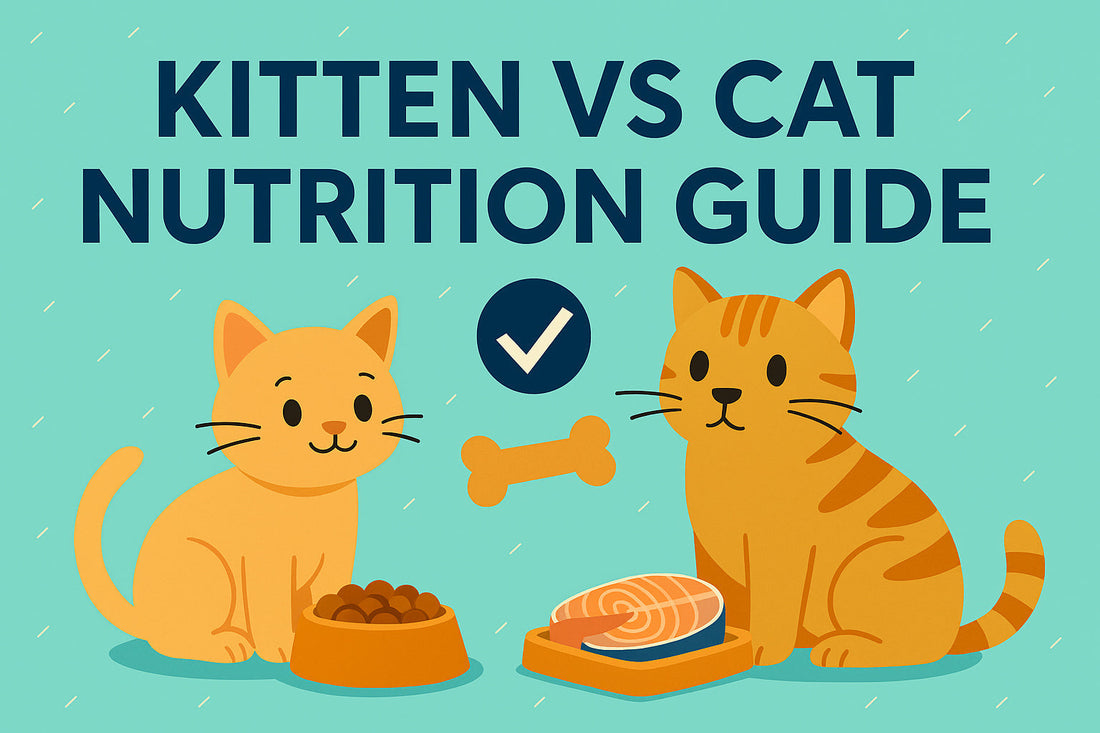
Kitten vs Cat Nutrition Guide: What Every Pet Owner Should Know
🍼 Why Kitten Nutrition Is Different
Kittens grow rapidly and need high-calorie, protein-rich food to support their development. In the first year of life, their bones, muscles, immune system, and brain are still forming, which means they require:
- More protein (at least 30–40%)
- DHA for brain and eye development
- Calcium and phosphorus for bone growth
- Frequent meals: 3–4 small feedings a day
Avoid feeding adult cat food to kittens — it's often too low in essential nutrients for their needs.
🐱 Adult Cat Nutrition Needs
Once your kitten reaches 12 months (or 18 months for large breeds), their metabolism slows. Now it’s time to switch to adult cat food, which is:
- Lower in calories to prevent obesity
- Balanced for maintenance rather than growth
- Rich in fiber for healthy digestion
- Includes taurine, an essential amino acid for heart health
Feeding adult food too early can stunt growth, while continuing kitten food too long can cause weight gain.
🐾 Dry vs Wet Food: What’s Best?
Kittens benefit from a mix of both wet and dry food — wet food helps with hydration and chewing, while dry food supports dental health.
Adult cats may need more wet food if they’re prone to dehydration or urinary issues.
💡 Pro Tip: Always provide fresh, clean water — especially if feeding dry kibble.
🍽️ Portion Sizes and Feeding Frequency
| Age | Meals per Day | Serving Size |
|---|---|---|
| 2–6 months | 4 meals | Small portions |
| 6–12 months | 3 meals | Medium portions |
| 12+ months | 2 meals | Based on weight |
Use feeding guidelines on the food packaging, but adjust based on your cat’s activity level and weight.
🧪 Ingredients to Look For
When choosing food, look for:
✅ Named protein sources (e.g., chicken, turkey, salmon)
✅ Omega-3 & 6 fatty acids
✅ Taurine
✅ No fillers like corn, soy, or artificial flavors
❌ Avoid foods with "meat by-products," artificial dyes, or preservatives like BHA/BHT.
😸 Common Mistakes to Avoid
- Feeding kitten food to adult cats (can lead to obesity)
- Feeding adult food to kittens (can cause nutrient deficiencies)
- Switching food too quickly without transition
- Overfeeding with treats — keep them under 10% of daily calories
🛒 Recommended Products
Coming soon: our vet-reviewed list of top-rated kitten and adult cat foods. Stay tuned!
📚 Learn More
Explore our Pet Food & Nutrition Hub for more expert advice and feeding guides.




